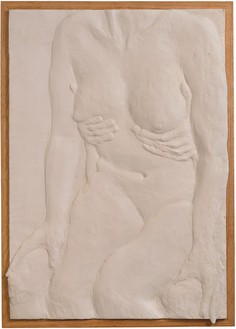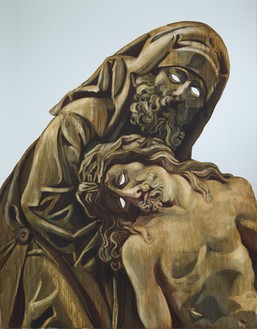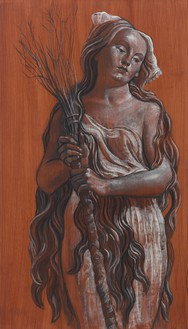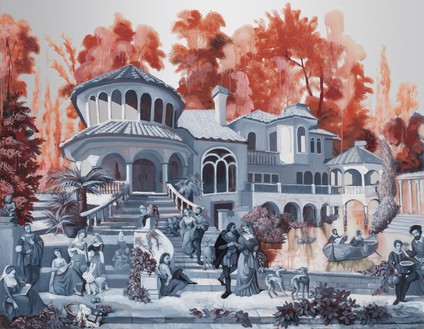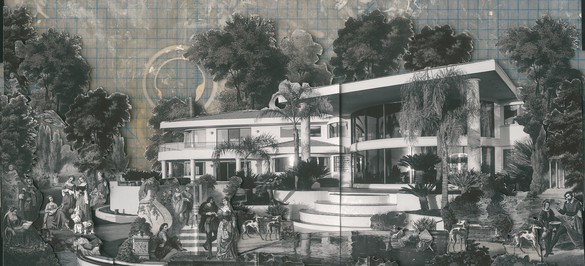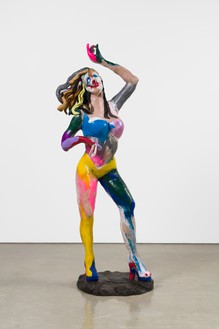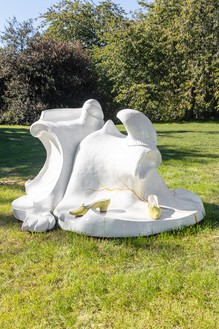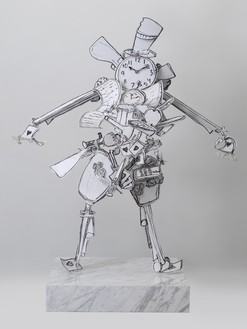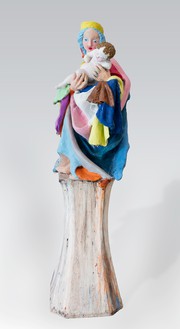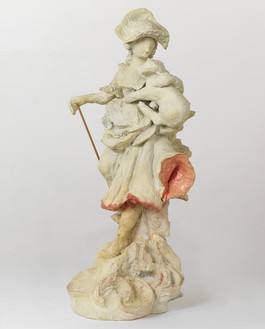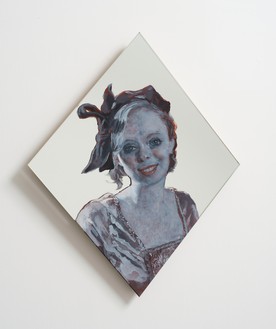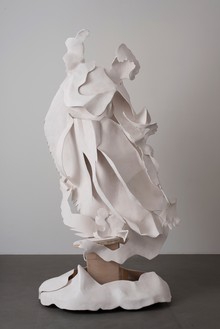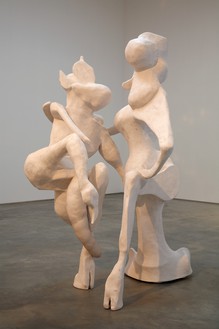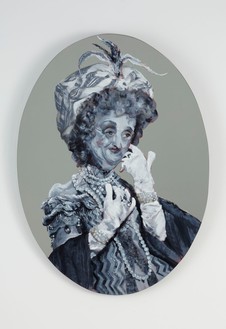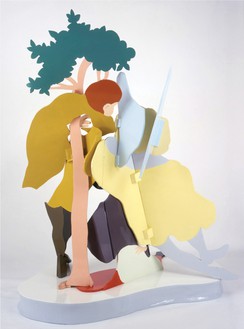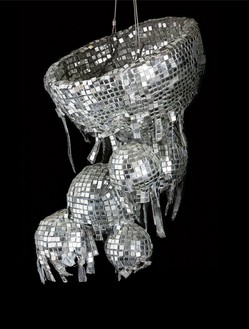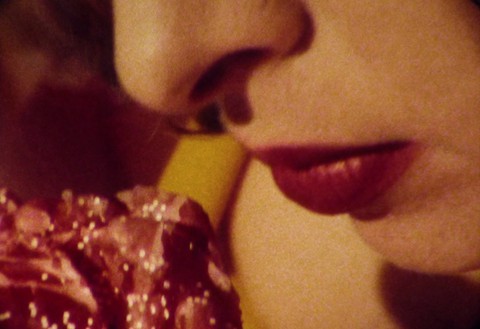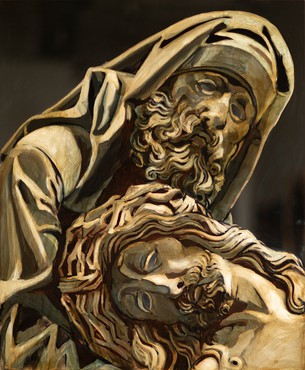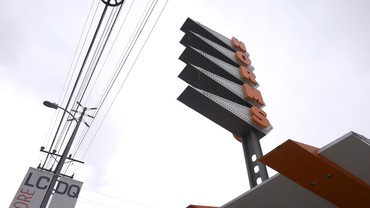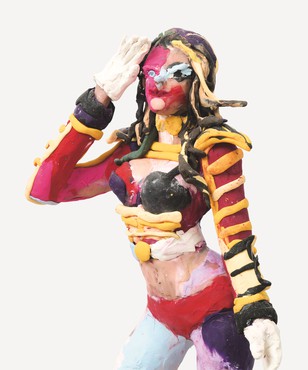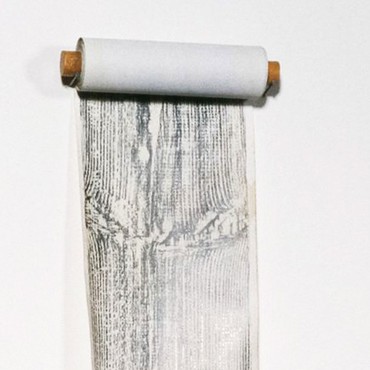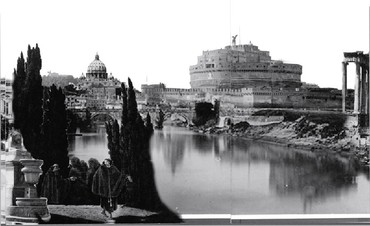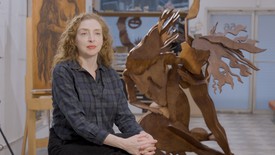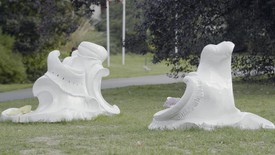About
I’ve always been interested in portraying some kind of fantasy, then showing that it’s completely constructed. There are always dark messages hidden behind beauty, and the act of sculpting is about listening to that inner voice that warns you about something lurking beneath the surface.
—Rachel Feinstein
In richly detailed sculptures and multipart installations, Rachel Feinstein investigates and challenges the concept of luxury as expressed in eighteenth- and nineteenth-century Europe, in the context of contemporary parallels. By synthesizing visual and societal opposites such as romance and pornography, elegance and kitsch, and the marvelous and the banal, she explores issues of taste and desire.
Born in Fort Defiance, Arizona, and raised in Miami, Feinstein received a BA in 1993 from Columbia University, New York, where she studied religion, philosophy, and studio art. That same year she attended the Skowhegan School of Painting and Sculpture in Maine. She found her passion for sculpture under the influence of mentors such as Kiki Smith, Ursula von Rydingsvard, and Judy Pfaff. In 1994 Feinstein was included in several group shows in New York, including Let the Artist Live! at Exit Art, where she presented a large gingerbread house modeled after Sleeping Beauty’s castle in which she slept throughout the exhibition.
Feinstein’s work was included in the first iteration of MoMA PS1’s Greater New York in 2000. She had her first solo exhibition at Marianne Boesky Gallery, New York, the following year, showing large plaster and wood sculptures of lions, swans, angels, and waterfalls, and transforming one of the galleries into an all-white Rococo-style salon, inspired by imperial palaces in Munich and Vienna. The construction of fantastical, multidimensional environments is integral to Feinstein’s practice. Preferring to see her work in complex interiors, she often brings Baroque elements into exhibition spaces, complicating the relationship between sculpture and painting, positive and negative space. The sculptures, viewed from certain angles, flatten, while the walls seem to expand through Feinstein’s use of mirrors and wallpaper.
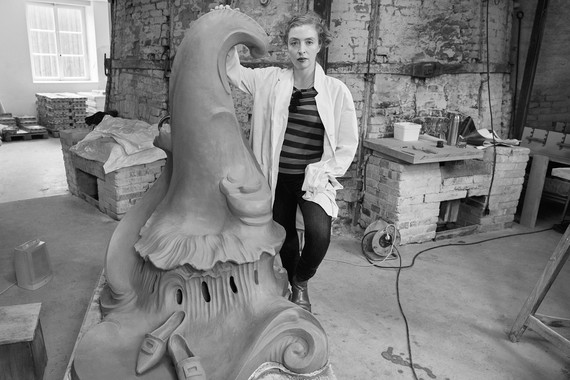
Photo: Markus Jans, Architectural Digest © Condé Nast
#RachelFeinstein
Exhibitions
Rachel Feinstein: Mirror
Join Rachel Feinstein in her New York studio as she addresses the genesis of her exhibition Mirror in London and the enduring power of religious iconography.
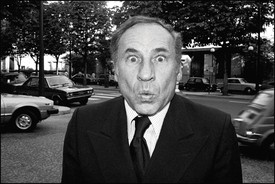
Jean Pigozzi: An interview with Rachel Feinstein
Famed photographer of the famous, Jean Pigozzi speaks with artist Rachel Feinstein about the publication of his new book, The 213 Most Important Men in My Life, and provides a sneak peek at what’s coming up next.
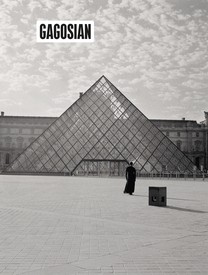
Now available
Gagosian Quarterly Summer 2021
The Summer 2021 issue of Gagosian Quarterly is now available, featuring Carrie Mae Weems’s The Louvre (2006) on its cover.
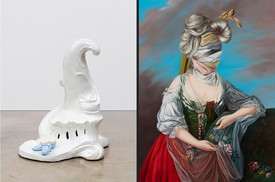
Artist to Artist: Rachel Feinstein and Ewa Juszkiewicz
On the occasion of Frieze New York 2021, the two artists discuss remixing conventions, the allure of Rococo, and the importance of research and history within their respective practices.
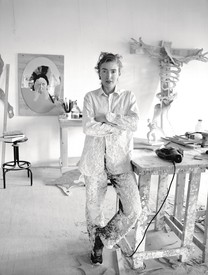
Rachel Feinstein
The artist discusses her life and work with Alan Yentob.
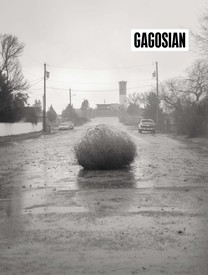
Now available
Gagosian Quarterly Winter 2019
The Winter 2019 issue of Gagosian Quarterly is now available, featuring a selection from Christopher Wool’s Westtexaspsychosculpture series on its cover.
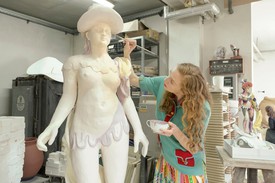
Rachel Feinstein at Chatsworth
A new sculpture by Rachel Feinstein has been unveiled on the grounds of Chatsworth, the celebrated Derbyshire estate, where Feinstein recently spent time as Gucci’s inaugural artist in residence. Alice Godwin tells the story of how it came to be.
Rachel Feinstein: Frieze Sculpture
Rachel Feinstein speaks about her outdoor installation for Frieze Sculpture 2018—a set of four majolica sculptures, inspired by Franz Anton Bustelli’s Rococo commedia dell’arte figurines.
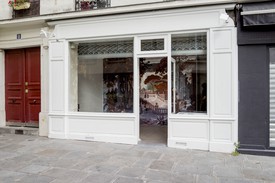
Rachel Feinstein Brings Rome to Paris
Rachel Feinstein speaks to Gagosian’s Angela Brown about “bringing Rome to Paris,” for her exhibition at Le Mur.
Fairs, Events & Announcements
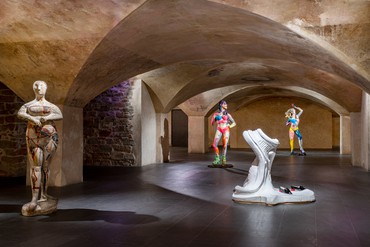
In Conversation
New Social Environment
Rachel Feinstein in Florence
Friday, September 8, 2023, 1pm edt
As part of the Brooklyn Rail’s online series New Social Environment, Rachel Feinstein joins the journal’s editor-at-large Andrew Woolbright for a conversation about the artist’s current exhibition, Rachel Feinstein in Florence, on view at the Museo Novecento and at three other museums in the city Museo Marino Marini, Museo Stefano Bardini, and Palazzo Medici Riccardi. In these daily lunchtime Zoom conversations, invited artists, writers, filmmakers, and poets discuss creative life in the context of our new social reality with Brooklyn Rail staff. The talk will conclude with a poetry reading by Rachel James.
Installation view, Rachel Feinstein in Florence, Museo Marino Marini, Florence, Italy, June 9–September 18, 2023. Artwork © Rachel Feinstein. Photo: Ela Bialkowska
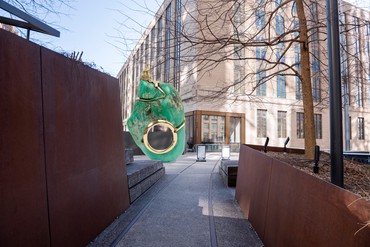
Honor
Rachel Feinstein
High Line Plinth
In 2023, Rachel Feinstein was invited to submit a proposal for the fifth and sixth High Line Plinth commissions, to be installed in 2026 and 2027 in New York. She was nominated alongside forty-eight other artists by an international advisory committee of artists, curators, and arts professionals convened by High Line Art. In March 2024, Feinstein’s Castle on the Rock proposal was one of twelve shortlisted by the committee. Maquettes of the shortlisted proposals are on view in the Coach Passage on the High Line at 30th Street from March 19 through June 2024, and the public is encouraged to share their feedback on the High Line website, which will be considered by the curatorial team during the selection process.
Rendering of Rachel Feinstein’s 17-foot sculpture Castle on the Rock for the High Line Plinth. Artwork © Rachel Feinstein
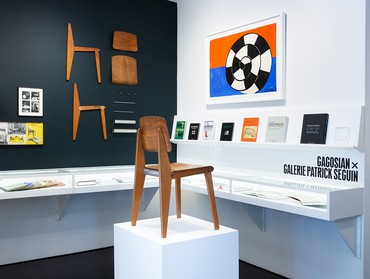
Visit
Madison Avenue Spring Gallery Walk 2023
Saturday, May 20, 2023, 10am–6pm
New York
madisonavenuebid.org
Join Artnews and the Madison Avenue Business Improvement District on a springtime walk to visit over sixty galleries that line Madison Avenue from East 57th to East 86th Streets. The Gagosian Shop is featuring an installation dedicated to Jean Prouvé’s 1947 demountable wood chair CB 22, alongside Rachel Feinstein’s newly launched ring collection with Ippolita and the Jewish Museum, and the latest Gagosian publications, including Louise Bonnet: Recent Paintings. An exhibition by Donald Judd spanning the 980 and 976 Madison Avenue galleries is also on view.
Jean Prouvé’s 1947 demountable wood chair CB 22 in the Gagosian Shop, New York
Museum Exhibitions
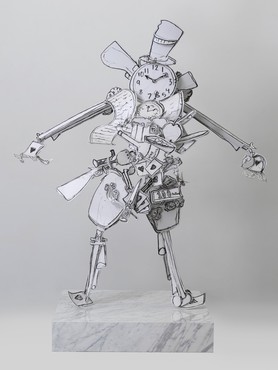
Closing this Week
Fairy Tales
Through April 28, 2024
Queensland Art Gallery and Gallery of Modern Art, Brisbane, Australia
www.qagoma.qld.gov.au
Fairy Tales explores centuries of beloved folk stories through contemporary art, costumes, immersive installations, and cinema from visual storytellers around the world. The exhibition aims to untangle themes of bravery and justice, loyalty and humility, cunning and aspiration. Work by Rachel Feinstein, Urs Fischer, and Carsten Höller is included.
Rachel Feinstein, Mr. Time, 2015 © Rachel Feinstein
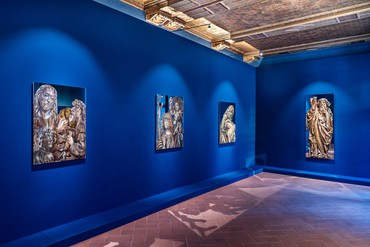
Closed
Rachel Feinstein in Florence
June 9–September 18, 2023
Various venues in Florence, Italy
www.museonovecento.it
Rachel Feinstein’s work is the subject of an exhibition project conceived and curated by Sergio Risaliti, director of the Museo Novecento, in collaboration with three other major museums in Florence: Palazzo Medici Riccardi, Museo Stefano Bardini, and Museo Marino Marini. The multipart exhibition places Feinstein’s sculpture and paintings, some shown in Italy for the first time, in dialogue with masterworks of the Italian Renaissance and Baroque period, demonstrating her ongoing fascination with the art of the past.
Installation view, Rachel Feinstein in Florence, Museo Stefano Bardini, Florence, Italy, June 9–September 18, 2023. Artwork © Rachel Feinstein. Photo: Ela Bialkowska
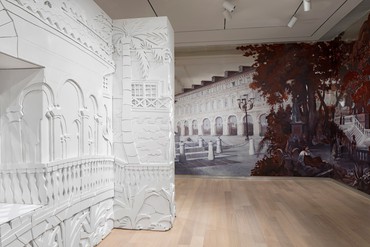
Closed
Rachel Feinstein
Façade
February 3–July 3, 2023
SCAD Museum of Art, Savannah, Georgia
www.scad.edu
In Façade, painted panoramas, large-scale sculptures, and 40-foot-long wall reliefs from across Rachel Feinstein’s career come together to form a labyrinth that shifts between reality and illusion. Each work featured in this multidimensional installation is an amalgamation of aesthetic and conceptual references, ranging from fairy tales and religious stories to art historical eighteenth-century European craft and twentieth-century American kitsch.
Installation view, Rachel Feinstein: Façade, SCAD Museum of Art, Savannah, Georgia, February 3–July 3, 2023. Artwork © Rachel Feinstein
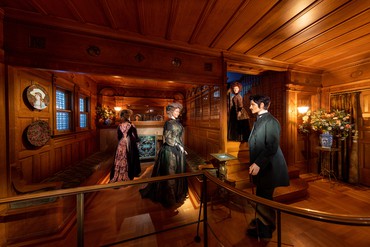
Closed
In America
An Anthology of Fashion
May 7–September 5, 2022
Metropolitan Museum of Art, New York
www.metmuseum.org
In America: An Anthology of Fashion is the second portion of a two-part exhibition exploring fashion in the United States. Men’s and women’s clothing dating from the nineteenth century to the mid-twentieth century is featured in vignettes installed in select period rooms in the museum’s American Wing, surveying more than two centuries of American domestic life. The exhibition reflects these narratives through a series of three-dimensional cinematic “freeze frames” produced in collaboration with notable American film directors, including Sofia Coppola, who enlisted Rachel Feinstein and John Currin to sculpt and paint the faces of her mannequins. These mise-en-scènes explore the role of dress in shaping American identity and address the complex and layered histories of the museum’s period rooms.
McKim, Mead & White Stair Hall staged by Sofia Coppola in collaboration with Rachel Feinstein and John Currin, Metropolitan Museum of Art, New York, 2022. Photo: © The Metropolitan Museum of Art, New York
